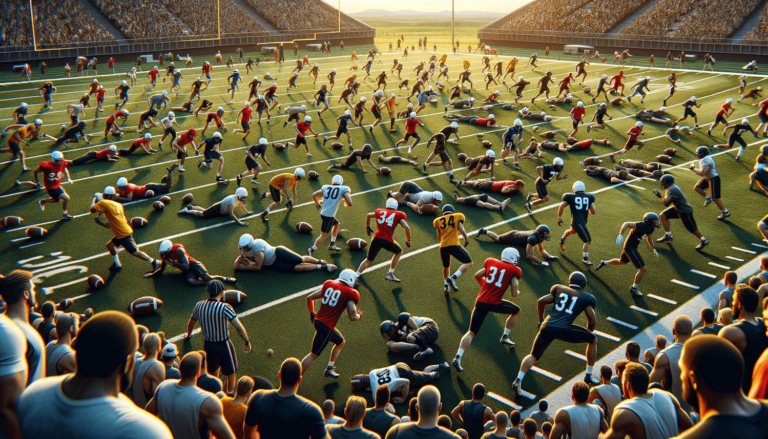
Football practice duration depends on various factors, such as team level, age group, and coaching goals, but typically lasts between 1.5 to 2.5 hours per session.
Factors Affecting Football Practice Duration
Understanding the factors affecting the length of a football practice session will help you prepare effectively and maximize training benefits. Factors include:
- Team level
- Age group
- Coaching goals
- Physical condition
- Time of season
Team Level
Higher-level teams often practice for longer periods, as they focus on complex strategies, conditioning, and skill mastery. Lower-level teams may emphasize basic skills and shorter practice sessions.
Age Group
Younger players have shorter attention spans, requiring practice sessions to be shorter in duration and include frequent breaks. Older, more experienced players can handle longer, more intense practice sessions.
High School Practices
High school teams typically practice 2 to 2.5 hours per session, focusing on skills, conditioning, and team strategy.
College Practices
College teams often practice up to 4 hours per day, but the practice time may be split into multiple sessions focused on individual and team skills, as well as strength and conditioning work.
Coaching Goals
The practice length will be determined by the coaching staff’s goals, which may include skills development, fitness, team cohesion, and tactical understanding.
Physical Condition
A team’s physical condition may impact practice duration. Preseason practices or sessions focused on building fitness may be longer, while lighter sessions during the competitive season could be shorter to allow for recovery.
Time of Season
Preseason practices tend to be longer to develop fitness and technique, while in-season sessions may be shorter to concentrate on individual matches and injury prevention.
Importance of Rest and Recovery
Rest and recovery play a critical role in maintaining a player’s health and performance, making it essential to balance practice time and intensity with appropriate rest periods. Adequate recovery between practices allows players to avoid burnout, reduces the risk of injury, and promotes long-term development.
Planning Effective Practice Sessions
A well-structured practice session is key to ensuring the optimal use of time and achieving the desired training outcomes. Ideally, a session should incorporate the following:
- Warm-up and stretching
- Individual skill development
- Group drills and tactics
- Conditioning and fitness
- Cooldown and recovery
Customizing Practice Duration for Individual Players
Not all players on a team may need the same amount of practice. Coaches should be mindful of individual fitness levels, positions, and skill sets to determine the ideal amount of practice time for each player. Utilizing a personalized approach will allow for more targeted development and enhance performance across the team.
The Role of Self-Directed Practice
In addition to team training, players should engage in self-directed practice to further develop their skills and achieve their personal goals. This may include working on specific technical aspects, watching film analysis, or participating in extra strength and conditioning sessions. Balancing individual practice with team sessions will better prepare players for competition and ensure lasting progress.
FAQ Section
After reading the blog post on the duration of football practice sessions, you may have additional questions. We’ve compiled a list of FAQs to help provide further insight into the topic and address your concerns.
1. How can I maximize the effectiveness of my practice time?
Focus on setting clear objectives for each session, prioritize skill development, utilize proper training equipment, and maintain a high level of engagement throughout the practice. Additionally, ensure that you engage in both team and self-directed training.
2. Should I avoid practicing on days before a match?
Practicing before a match is essential for preparing both mentally and physically, but the intensity and duration should be reduced. Focus on lighter sessions involving tactical discussions, mental preparation, and optimizing personal recovery.
3. How often should football practice sessions be held each week?
The frequency of practices will depend on factors like team level, age group, and competition schedule. Generally, high school and college teams practice daily during the week, while younger players might require fewer sessions.
4. Is the duration of football practice the same for all positions?
No, the practice duration and content might differ for players in various positions. For instance, goalkeepers might need specialized training with dedicated goalkeeper coaches, while midfielders could require extra fitness work.
5. How can coaches find the right balance between drills, conditioning, and tactical training?
A well-structured training plan that divides practice time effectively is key. Coaches should evaluate their team’s needs, prioritize individual and group objectives, and allocate practice time accordingly to balance technical, tactical, and physical development.
Featured Posts
- No pillar pages found.





